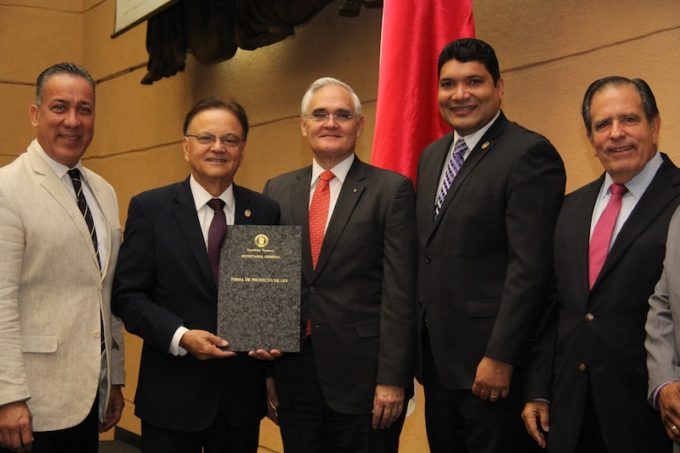
Now into the last month of a National Assembly session, legislators stall
by Eric Jackson
Hey, they took a field trip to the farmers’ market down the street, cut the ribbon on a new cafeteria for themselves, sponsored a sparsely attended seminar on social responsibility, mostly ignored a suplente’s plea for a low carbon emissions policy and let the students take over their chambers for a day. They even endorsed a walk-a-thon against breast and prostate cancer. What more could you ask of a busy legislature?
The National Assembly, like the other branches of government, is mired in scandal. Most prominent of all, but by no means the greater part of it there is the matter of Odebrecht. This company gave at least $20,000 to the president of the National Assembly, Yanibel Ábrego. Neither she nor her colleagues raised any questions about the billions of dollars of overpriced public works contracts that went that Brazilian-based company’s way, generally via no-bid or rigged-bid procedures. Yanibel’s not available to talk about that.
Last March, a legislative subcommittee was appointed to look into what might be done to reduce government corruption. The head of that subcommittee, PRD deputy Elias Castillo, is fingered by a jailed executive of road contractor Transcaribe Trading SA as having taken $10,000 from that company. Castillo had his suplente answer the questions about that — it was a “donation,” so the plea went, so that makes it OK.
In August Panameñista deputy Jorge Alberto Rosas was obliged to resign as head of the legislature’s Credentials Committee, which would hear bribery cases against a Supreme Court magistrate, the president or a member of the president’s cabinet, when a both a former Odebrecht lawyer turned state’s evidence (in Spain) and someone who was a lawyer in Rosas’s firm revealed that Rosas received more than $3 million for setting up companies and bank accounts for the rogue Brazilian company’s international bribery and money laundering operations. At the end of September Rosa spoke to La Estrella about the case. It wasn’t as if those millions of dollars in Odebrecht money went into his pocket, Rosas pleaded. It was being moved through him from one Odebrecht account to another. That’s awfully close to an admission of money laundering to avoid a perception of bribery, and we are expected to believe that he did this without compensation or further understandings for a corporate client.
(What’s this about a legislator moonlighting as a lawyer? Isn’t there a rule against legislators running private businesses on the side while serving in the National Assembly? Yes there is, but the deputies voted to exempt the attorneys in their midst from that rule.)
The litany could continue to touch almost every member of the legislature. But fear not! There are a half-dozen proposed anti-corruption laws in the hopper. Plus, President Varela has promised to send five more such to the National Assembly.
However, this is October and at the end of this month the legislative session ends. All things unpassed die, although they might be raised again in another session. With most of the bills offered by individual deputies such a death appears to be the intention. As in, politicians who took from Odebrecht or TCT, or who helped themselves to public assets, or who put their kids on the government payroll or their names on public property will say that they TRIED to uphold the rule of law but it got lost in the shuffle. Varela’s proposals have yet to be seen and his campaign took millions from Odebrecht. It seems unlikely that he’ll want to put himself front an center in any real anti-corruption debate. Thus it’s a good bet that neither whatever the president had in mind, nor the legislator-proposed protections for government-employed whistleblowers, requirements for public employees to disclose their sources of income from the years prior to their going on the public payroll, review of the legislature’s own contracts, rewards for witnesses who come forward with information that leads to convictions for public corruption and so on will go anywhere before the month runs out everything turns into pumpkins. In any case, no committee hearings have been scheduled for any of the legislators’ anti-corruption proposals.
There is, however, one proposal before the legislature by petition, an amendment to the Code of Criminal Procedure that would abolish the statute of limitations for public corruption crimes. Jorge Alberto Rosas was on the subcommittee to deal with that one. First he proposed to dismiss the petition because only legislators or the other branches of government should propose new laws. Then he suggested a substitute that would delay and gut the proposal. Then, under harsh public criticism, he resigned from the subcommittee.
Will the legislature find a way to deep-six the proposal? If they do that, rather than pass it in watered down form, they run the risk of provoking an unprecedented petition drive that puts a law on the ballot for a referendum. The list of signers of such a thing would be something that every politician running on a reform platform would crave. The end run around the current political scheme that’s dominated by party bosses would not be something that the political caste wants to see. So there is a chance that some change to the statute of limitations for public corruption crimes will be debated and passed by the legislature this month.
~ ~ ~
These announcements are interactive. Click on them for more information.










